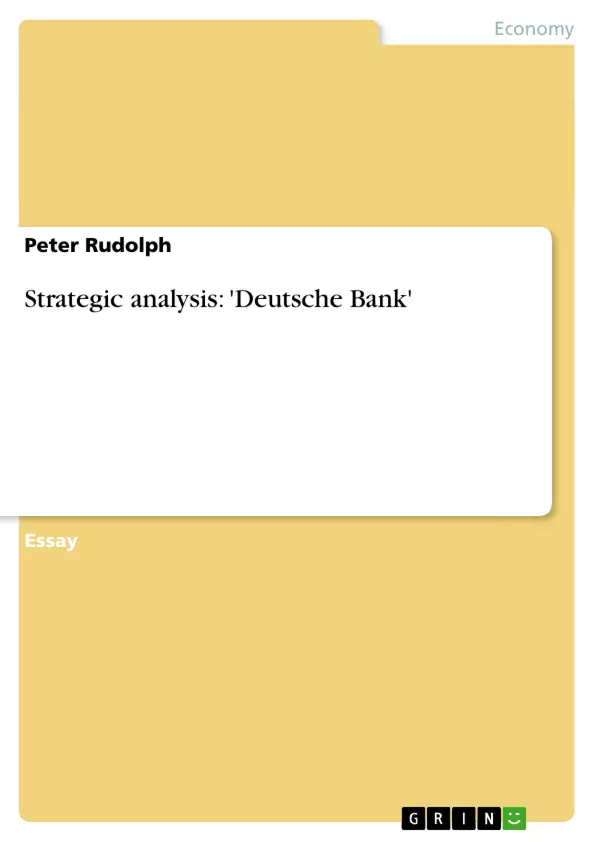This paper defines the external environment Deutsche Bank AG. According to Farnham, (1999) the PESTEL analysis and Porters (1980) five forces model provide a useful start for analysing the external environment and providing a crucial set of inputs for strategic development and implementation. Building up on the information gathered it will be discussed what key challenges the organisation is facing, the significance of these challenges and how they might be overcome.
The world today is changing faster than ever before. Technological developments, financial constraints, expanding markets, restructuring and mergers, new philosophies and government legislation are all putting pressure on organisations to change and stay dynamic (Davenport et al ,1990; Aijo et al, 1996). It is said that if organisations do not pay attention to environmental changes, they may not survive at all (Fahey et al, 1986). This paper defines the external environment Deutsche Bank AG is facing in its German retail branch unit. According to Farnham, (1999) the PESTEL analysis and Porter’s (1980) five forces model provide a useful start for analysing the external environment and providing a crucial set of inputs for strategic development and implementation. Building up on the information gathered it will be discussed what key challenges the organisation is facing, the significance of these challenges and how they might be overcome. Finally, strategic implications on are suggested.
Inhaltsverzeichnis (Table of Contents)
- Deutsche Bank AG
- Environmental Analysis and Significance of Challenges
- PESTEL Analysis
- Political
- Economic
- Socio-Cultural
- Technological
- Porter's Five Forces Model
Zielsetzung und Themenschwerpunkte (Objectives and Key Themes)
This paper aims to define the external environment Deutsche Bank AG faces in its German retail branch unit. Using PESTEL analysis and Porter’s five forces model, the paper identifies key challenges the organization faces and explores potential solutions. Finally, it provides strategic implications for the company’s future development.
- External environment analysis
- Challenges faced by Deutsche Bank AG
- Strategic implications for Deutsche Bank AG
- PESTEL framework
- Porter’s five forces model
Zusammenfassung der Kapitel (Chapter Summaries)
- Deutsche Bank AG: This section provides an overview of Deutsche Bank AG, including its global presence, key divisions, and recent restructuring efforts.
- Environmental Analysis and Significance of Challenges: This section focuses on the importance of external environment analysis for organizational success. It introduces the PESTEL framework as a tool for examining the general business environment and discusses its relevance for anticipating future trends and managing potential threats and opportunities.
- PESTEL Analysis: This section delves into the specific elements of the PESTEL framework, examining political, economic, socio-cultural, technological, environmental, and legal factors that impact Deutsche Bank AG’s German retail branch unit. It highlights key trends and challenges within each category.
- Porter’s Five Forces Model: This section presents Porter’s five forces model as a technique for analyzing the microenvironment and identifying the level of competition within an industry. It emphasizes the importance of considering the characteristics of the industry in relation to technological and economic factors, as well as government regulation.
Schlüsselwörter (Keywords)
The key concepts and focus topics of this paper include external environment analysis, PESTEL framework, Porter’s five forces model, political factors, economic factors, socio-cultural factors, technological factors, strategic implications, Deutsche Bank AG, and German retail banking.
Frequently Asked Questions
What is a PESTEL analysis?
It is a framework used to analyze the external environment of a business, covering Political, Economic, Socio-Cultural, Technological, Environmental, and Legal factors.
What are Porter's Five Forces?
A model to analyze industry competition, focusing on: 1. Rivalry, 2. Threat of new entrants, 3. Threat of substitutes, 4. Bargaining power of buyers, and 5. Bargaining power of suppliers.
What challenges does Deutsche Bank face in the German retail market?
Key challenges include rapid technological changes, financial constraints, new government legislation, and intense competition in the retail banking sector.
Why is environmental analysis crucial for strategic development?
It provides inputs to stay dynamic and helps organizations survive by anticipating changes in the faster-moving global market.
How can Deutsche Bank overcome its strategic challenges?
The paper suggests strategic implications such as restructuring, embracing technological developments, and adapting to new philosophies in banking.
What is the significance of technological factors in banking?
Technological developments put pressure on traditional branch units to digitize and stay competitive against new market entrants.
- Arbeit zitieren
- Peter Rudolph (Autor:in), 2005, Strategic analysis: 'Deutsche Bank', München, GRIN Verlag, https://www.grin.com/document/34462



